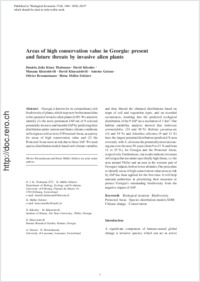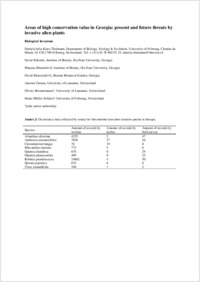Areas of high conservation value in Georgia: present and future threats by invasive alien plants
- Thalmann, Daniela Julia Klara Department of Biology, Ecology and Evolution, University of Fribourg, Switzerland
- Kikodze, David Institute of Botany, Ilia State University, Tbilisi, Georgia
- Khutsishvili, Manana Institute of Botany, Ilia State University, Tbilisi, Georgia
- Kharazishvili, David Institute of Botany, Ilia State University, Tbilisi, Georgia
- Guisan, Antoine University of Lausanne, Lausanne, Switzerland
- Broennimann, Olivier University of Lausanne, Lausanne, Switzerland
- Müller-Schärer, Heinz Department of Biology, Ecology and Evolution, University of Fribourg, Switzerland
-
29.08.2014
Published in:
- Biological Invasions. - 2015, vol. 17, no. 4, p. 1041–1054
English
Georgia is known for its extraordinary rich biodiversity of plants, which may now be threatened due to the spread of invasive alien plants (IAP). We aimed to identify (1) the most prominent IAP out of 9 selected potentially invasive and harmful IAP by predicting their distribution under current and future climate conditions in Georgia as well as in its 43 Protected Areas, as a proxy for areas of high conservation value and (2) the Protected Areas most at risk due to these IAP. We used species distribution models based on 6 climate variables and then filtered the obtained distributions based on maps of soil and vegetation types, and on recorded occurrences, resulting into the predicted ecological distribution of the 9 IAP’sat a resolution of 1 km2. Our habitat suitability analysis showed that Ambrosia artemisiifolia, (24 and 40 %) Robinia pseudoacaia (14 and 19 %) and Ailanthus altissima (9 and 11 %) have the largest potential distribution (predicted % area covered), with A. altissima the potentially most increasing one over the next 50 years (from 9 to 13 % and from 11 to 25 %), for Georgia and the Protected Areas, respectively. Furthermore, our results indicate two areas in Georgia that are under specifically high threat, i.e. the area around Tbilisi and an area in the western part of Georgia (Adjara), both at lower altitudes. Our procedure to identify areas of high conservation value most at risk by IAP has been applied for the first time. It will help national authorities in prioritizing their measures to protect Georgia’s outstanding biodiversity from the negative impact of IAP.
- Faculty
- Faculté des sciences et de médecine
- Department
- Département de Biologie
- Language
-
- English
- Classification
- Biological sciences
- License
- License undefined
- Identifiers
-
- RERO DOC 255656
- DOI 10.1007/s10530-014-0774-2
- Persistent URL
- https://folia.unifr.ch/unifr/documents/304409
Other files
Statistics
Document views: 92
File downloads:
- mue_ahc.pdf: 200
- mue_ahc_sm.pdf: 109

